Sleep hygiene, or higiene del sueño, refers to practices that promote better sleep quality. It involves maintaining consistent routines, creating a sleep-friendly environment, and avoiding stimulants. Spanish-language resources offer tailored advice for improving sleep habits, emphasizing cultural adaptability and the importance of rest for overall well-being.
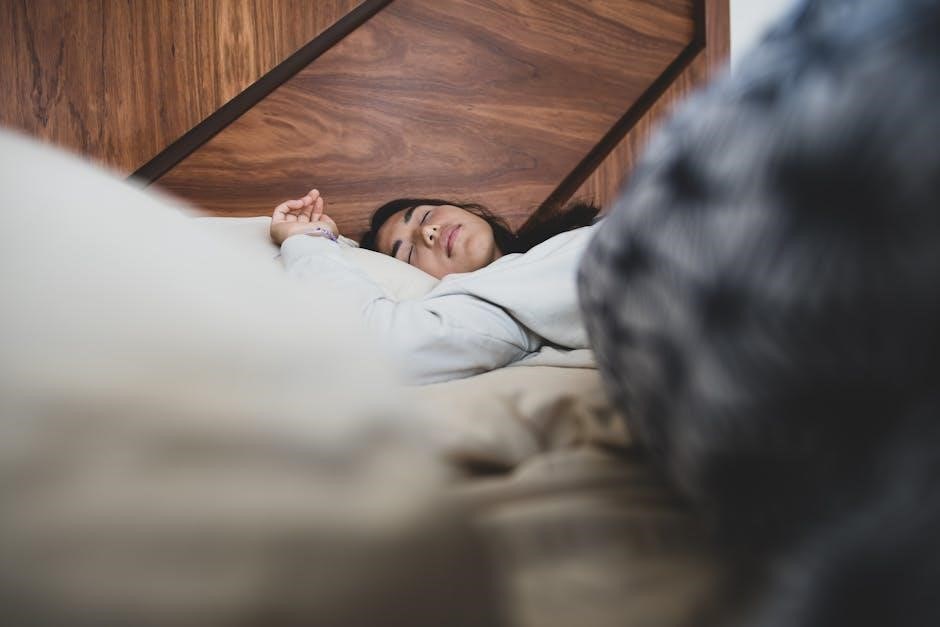
What is Sleep Hygiene?
Sleep hygiene refers to a set of practices designed to improve sleep quality and duration. It involves maintaining consistent sleep schedules, creating a sleep-friendly environment, and avoiding stimulants like caffeine or electronic devices before bedtime. These habits help address common sleep issues and promote a restful, rejuvenating sleep experience, essential for overall well-being.
Why Focus on Sleep Hygiene in Spanish?
Focusing on sleep hygiene in Spanish is essential for addressing sleep challenges within Spanish-speaking populations. Tailored resources in Spanish provide culturally adapted advice, ensuring accessibility and relevance. By emphasizing consistent routines, environmental adjustments, and lifestyle modifications, sleep hygiene practices in Spanish help improve sleep quality and overall well-being for diverse demographics, including adults, children, and those with specific cultural sleep practices.
Benefits of Good Sleep Hygiene
Good sleep hygiene enhances physical and mental restoration, improving cognitive function, emotional stability, and overall well-being. It supports a healthy lifestyle and optimal daily performance.
Physical Health Benefits
Good sleep hygiene supports cardiovascular health, strengthens the immune system, and aids in inflammation reduction. It helps regulate hormones, improving metabolic function and weight management. Adequate sleep duration enhances physical restoration, reducing the risk of chronic diseases like diabetes and hypertension. Maintaining a consistent sleep schedule and avoiding stimulants promotes better overall physical well-being, ensuring the body functions optimally.
Mental and Emotional Benefits
Good sleep hygiene improves cognitive function, enhances concentration, and boosts memory. It supports emotional stability, reducing stress and anxiety levels. Adequate sleep helps regulate mood, preventing irritability and depression. By promoting mental clarity and resilience, proper sleep habits contribute to better emotional well-being, enabling individuals to handle daily challenges more effectively and maintain a positive outlook on life.
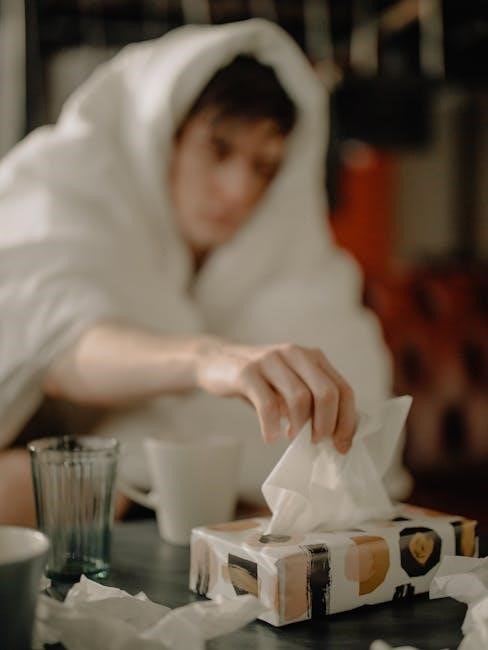
How to Create a Sleep Hygiene Guide in Spanish
A comprehensive Spanish guide should include consistent routines, a sleep-friendly environment, and tips to avoid stimulants. Emphasize the importance of maintaining regular sleep schedules and limiting screen time before bed to enhance sleep quality and duration.
Key Components of a Sleep Hygiene PDF
A Spanish sleep hygiene guide should include consistent sleep schedules, a sleep-friendly environment, and tips to avoid stimulants. It should emphasize maintaining regular routines, limiting screen time before bed, and creating a relaxing bedtime routine. Additionally, it should address the importance of physical activity, diet, and avoiding substances like caffeine and alcohol. Cultural adaptability and practical recommendations for different lifestyles should also be highlighted to ensure effectiveness and accessibility.
Essential Recommendations to Include
Include tips for maintaining a consistent sleep schedule, avoiding caffeine and alcohol before bed, and limiting screen time. Emphasize the importance of a dark, quiet sleep environment and regular physical activity. Provide advice on avoiding heavy meals close to bedtime and encourage relaxation techniques. Highlight the benefits of short naps and the need to avoid stimulants in the evening. Ensure recommendations are practical and adaptable to different lifestyles for better sleep quality.
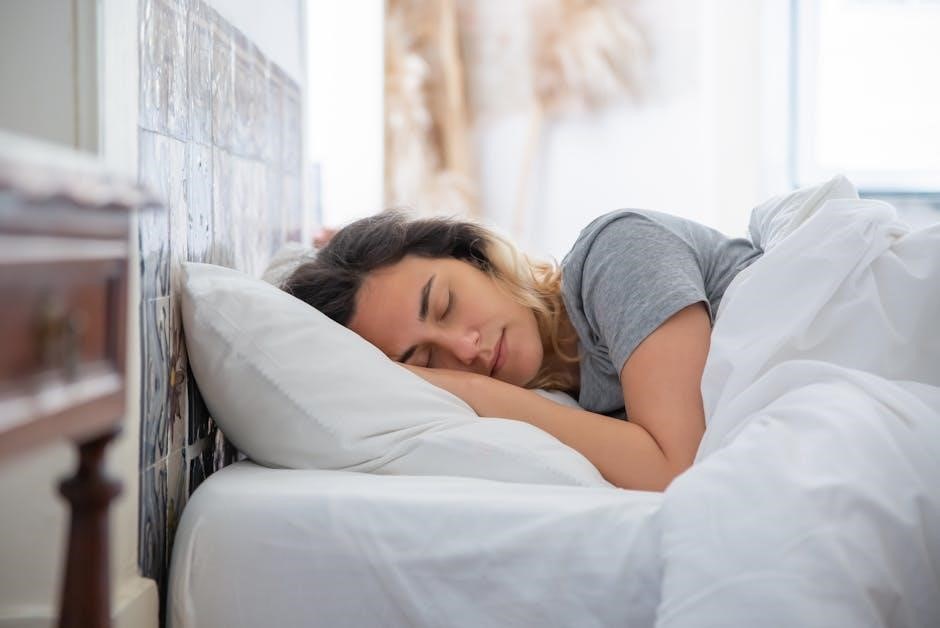
Lifestyle Factors Impacting Sleep Hygiene
Diet, physical activity, and screen time significantly influence sleep quality. Limiting caffeine, avoiding heavy meals, and reducing evening device use promote healthier sleep patterns and routines.
Diet and Nutrition
Diet plays a crucial role in sleep quality. Avoiding caffeine, chocolate, and heavy meals close to bedtime is essential. Opt for light, balanced dinners rich in nutrients. Limit alcohol and sugary foods, as they disrupt sleep patterns. Incorporating foods that promote relaxation, such as herbal teas, can enhance sleep hygiene. A well-balanced diet supports overall health and contributes to better rest, making it a key component of maintaining good sleep habits.
Exercise and Physical Activity
Regular physical activity enhances sleep quality by reducing stress and improving bodily functions. Moderate-intensity exercises, such as walking or cycling, are ideal. However, avoid vigorous workouts close to bedtime, as they can stimulate the body. Incorporating exercise into daily routines promotes better sleep patterns, contributing to overall well-being and restful nights. Finding a balance between activity and relaxation is key to maintaining healthy sleep hygiene practices.
Screen Time and Electronic Devices
Limiting screen time is crucial for improving sleep hygiene. The blue light emitted by smartphones, tablets, and computers suppresses melatonin production, making it harder to fall asleep. Avoid using electronic devices at least two hours before bedtime. Instead, opt for relaxing activities like reading or meditation. Reducing screen time helps create a calming pre-sleep routine, promoting better sleep quality and duration. Establishing boundaries with technology fosters healthier sleep habits and enhances overall well-being.
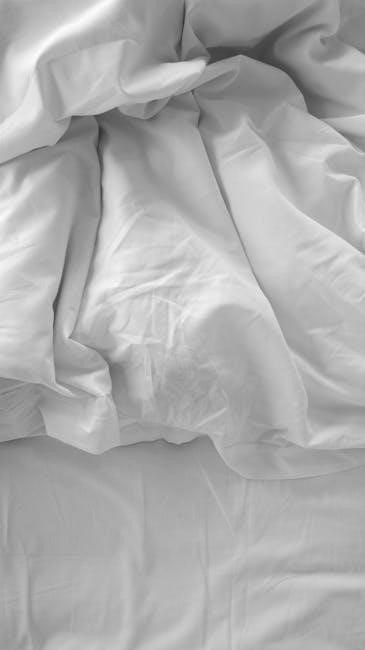
Troubleshooting Common Sleep Issues
Identifying sleep disorders like insomnia or sleep apnea is key. Addressing challenges involves lifestyle adjustments, consistent routines, and creating a sleep-friendly environment to improve sleep quality effectively.
Identifying Sleep Disorders
Identifying sleep disorders involves recognizing symptoms like excessive daytime sleepiness or difficulty falling asleep. Conditions such as insomnia, sleep apnea, or restless legs syndrome can disrupt sleep patterns. Spanish-language resources provide guidelines for self-assessment and professional diagnosis, emphasizing the importance of early detection for effective treatment and improved sleep hygiene practices.
Addressing Sleep Challenges
Addressing sleep challenges involves implementing strategies to overcome obstacles like irregular schedules or environmental disruptions. Recommendations include maintaining consistent sleep times, avoiding stimulants, and creating a relaxing bedtime routine. Spanish-language guides emphasize the importance of a sleep-conducive environment and limiting screen time before bed. These practices help individuals address common sleep difficulties and improve overall sleep quality effectively.
Cultural Considerations in Sleep Hygiene
Cultural practices significantly influence sleep habits, making it essential to adapt sleep hygiene recommendations to specific cultural contexts for effective results and improved well-being.
Cultural Differences in Sleep Practices

Cultural differences significantly influence sleep practices, with variations in sleep schedules, environments, and habits. In Spanish-speaking cultures, siestas are common, reflecting a unique approach to rest. These practices, rooted in tradition and lifestyle, highlight the importance of adapting sleep hygiene recommendations to cultural norms to ensure effectiveness and acceptance within diverse communities. Understanding these differences is key to promoting sleep health effectively. Avoiding stereotypes while respecting cultural traditions is essential for successful implementation. This ensures personalized and culturally sensitive sleep hygiene advice.

Adapting Sleep Hygiene Practices
Adapting sleep hygiene practices involves tailoring recommendations to individual needs and cultural contexts. For Spanish-speaking populations, this may include incorporating siestas or adjusting routines to fit lifestyle preferences. Key strategies include maintaining consistent sleep schedules, avoiding stimulants like caffeine, and creating a restful environment. Flexibility and cultural sensitivity are crucial for effective adaptation, ensuring practices are both practical and sustainable. This approach fosters better sleep outcomes and overall well-being.
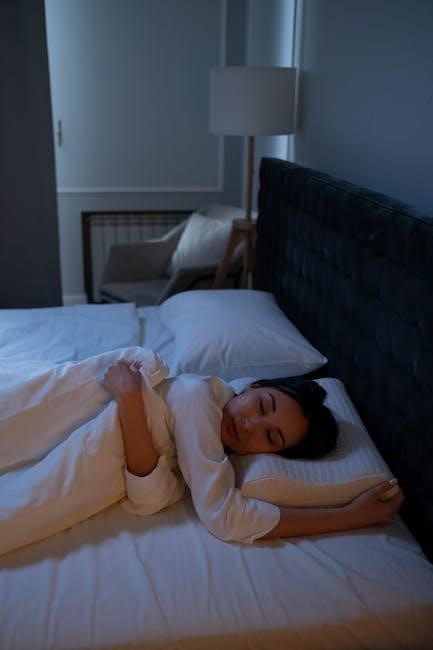
Implementing Sleep Hygiene Practices
Implementing sleep hygiene involves creating routines and environments that promote restful sleep. Consistency, a calming bedroom, and avoiding stimulants are key strategies for better sleep outcomes.
Creating a Sleep-Friendly Environment
Creating a sleep-friendly environment is crucial for improving sleep quality. Ensure your bedroom is quiet, dark, and cool, using blackout curtains or earplugs if necessary. Invest in a comfortable mattress and pillows, and keep the room tidy. Avoid screens like phones or computers before bed, as their blue light disrupts melatonin production. A calming ambiance, such as soft colors or aromatherapy, can enhance relaxation. These adjustments help create a space conducive to restful sleep, promoting better overall well-being.
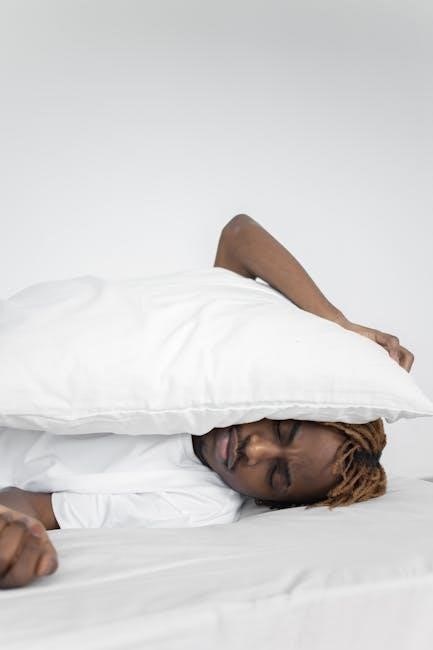
Building a Consistent Routine
Establishing a consistent sleep schedule is vital for improving sleep hygiene. Set a fixed bedtime and wake-up time, including weekends, to regulate your body’s internal clock. Develop calming pre-sleep activities, such as reading or relaxation techniques, to signal your body it’s time to rest. Avoid stimulating tasks before bed and maintain a predictable routine, even during vacations or days off. Consistency helps train your body to fall asleep and stay asleep more effectively, enhancing overall sleep quality and well-being.
Measuring Success in Sleep Hygiene
Track improvements in sleep quality, duration, and consistency. Assess how well new habits are maintained and their impact on physical and mental well-being over time.
Assessing Sleep Quality
Assessing sleep quality involves evaluating duration, depth, and consistency. Tools like sleep diaries or wearable devices can monitor patterns and identify improvements. Spanish-language guides recommend tracking how often you wake up, how quickly you fall asleep, and overall restfulness. These metrics help determine if sleep hygiene practices are effectively enhancing your rest and daily functioning.
Maintaining Long-Term Results

Maintaining long-term sleep hygiene requires consistent effort and adaptability. Spanish-language guides emphasize the importance of routines, such as regular sleep schedules and a soothing bedtime routine. Avoiding stimulants like caffeine and electronics before bed is crucial. Over time, tracking progress and making small adjustments can ensure lasting improvements. A sleep-friendly environment and mindfulness of lifestyle choices also play key roles in sustaining better sleep quality for years to come.
Prioritizing sleep hygiene is essential for long-term health and well-being. By adopting consistent routines and a sleep-friendly lifestyle, individuals can achieve restorative sleep and improve their quality of life.
The Importance of Prioritizing Sleep
Prioritizing sleep is crucial for overall health and well-being. Consistent routines, a sleep-friendly environment, and avoiding stimulants like caffeine promote better sleep quality. These practices, outlined in Spanish resources, help address common sleep challenges and improve physical and mental restoration.
By valuing sleep as a foundational aspect of health, individuals can enhance their daily functioning and long-term quality of life, ensuring restorative rest every night.
Final Thoughts on Sleep Hygiene
Emphasizing sleep hygiene is vital for achieving restorative rest and improving overall health. By adopting consistent routines, avoiding stimulants, and creating a sleep-friendly environment, individuals can enhance sleep quality. These practices, supported by Spanish-language resources, highlight the cultural adaptability of sleep hygiene, ensuring its relevance across diverse populations.
Prioritizing sleep fosters physical restoration, mental clarity, and emotional well-being, making it a cornerstone of a healthy lifestyle. Implementing these strategies can lead to long-term benefits, promoting a better quality of life for individuals of all ages.
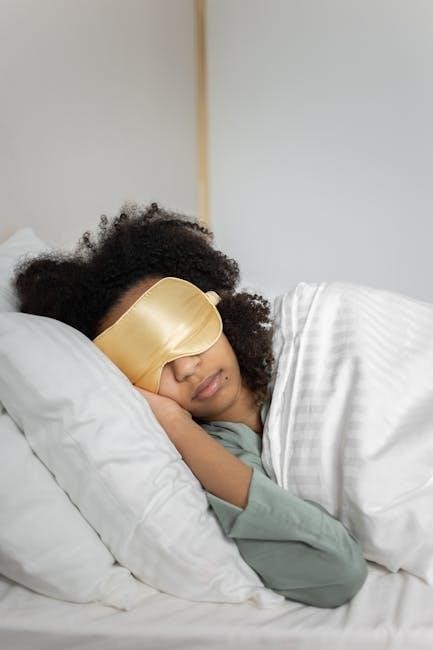
No Responses